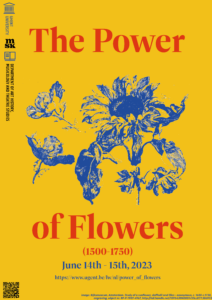
Conference: The Power of Flowers, 1500-1750
Ghent, Belgium, 14-15 June 2023
Flowers and fruits have been mobilized as expressions of power and counter-power since long before the poet Allen Ginsberg coined the slogan “Flower Power” in 1965 to encourage nonviolent protest and Hippies in San Francisco’s Haight-Ashbury area weaved flowers in their hair. In the newly founded Dutch Republic, the house of Orange-Nassau relied on the orange not only as a short-hand for its name, but also a signifier of the trading empire it developed; Sultan Süleiman the Magnificent was known for his taste in gardens and incorporated flowers in his official insignia (Tughra), a complex work of calligraphy that conveyed the power and legitimacy of his rule. During the early modern (re)discovery of nature, flowers and their fruits, local and foreign, offered unique promises for profit while their pictorial representations promoted their commercial potential and could also stand as artistic objects. This interdisciplinary conference aims to investigate how flowers, and the fruits they produce, represented power in a myriad of ways in the early modern world. The speakers will address the function of flowers (including the flowering process, culminating in fruit) as tools of political, religious, or commercial power, as instruments of global and local knowledge transfer and appropriation, as well as their role in art-making, science, and the construction of gender between c. 1500-1750.
Organization
This conference is organized by Prof. dr. Jaya Remond, Assistant Professor of Early Modern Art History at Ghent University, and Dr. Catherine Powell-Warren, FWO Postdoctoral Researcher in Art History at Ghent University. For any practical questions, please contact Lien Vandenberghe (lien.vandenberghe@ugent.be) or Lisa Schepens (l.schepens@ugent.be).
Registration and Program Information